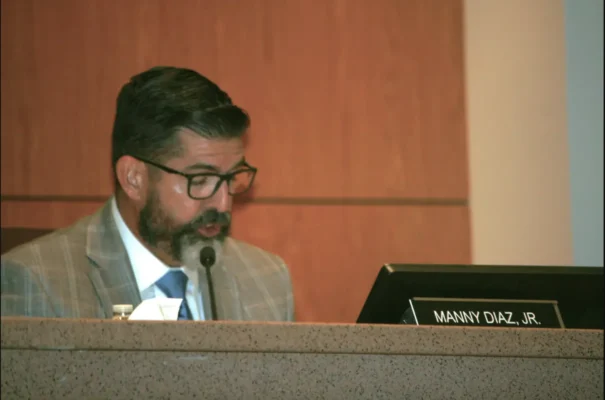A Florida public school has been fined and placed on administrative probation for allowing a male student to compete in female sports.
According to a letter from the Florida High School Athletic Association (FHSAA) to Monarch High School’s Principal Moira Sweeting-Miller, the high school “permitted a biological male to participate on the girls volleyball team during the 2022-23 and 2023-24 Girls Volleyball seasons,” thereby violating Florida law.
Monarch High School permitted the ineligible athlete to participate in 33 contests from 2022 to 2023.
Florida’s bylaw 8.62 states that “biological males may not participate on a female team in any sport,” the letter to Monarch High School says.
Policy 16.11.6 states that the “use of an ineligible student when self-reported, may subject the school to a monetary penalty of a minimum of $100 per contest and/or other sanctions.”
F.S. 1006.205(3)(c) states that “athletic teams or sports designated for females, women, or girls may not be open to students of the male sex.”
The FHSAA did not receive any corrective actions from Monarch High School, and thus fined it $500 per contest, resulting in a $16,500 fine.
The high school, after being reprimanded and fined, was placed on administrative probation for one year. Furthermore, the high school principal and athletic director will be required to attend a compliance seminar given by the FHSAA in the summer of 2024 and again in 2025.
Also, the high school is required to host FHSAA staff for a compliance and eligibility workshop to be conducted no later than June 30, 2024.
“Thanks to the leadership of Governor Ron DeSantis, Florida passed legislation to protect girls’ sports and we will not tolerate any school that violates this law,” Florida Education Commissioner Manny Diaz Jr. said in statement on X.
“We applaud the swift action taken by the FHSAA to ensure there are serious consequences for this illegal behavior.”

Pronouns
Despite Florida having passed laws to restrict the promotion of woke ideology and inappropriate material in public schools, an Orange County school board is preparing to use preferred pronouns if teachers receive permission and consent from their students’ parents—even if those pronouns do not correspond with the student’s sex at birth.
In 2023, Florida passed HB 1069, expanding the earlier Parents’ Bill of Rights. It prohibits schools from forcing employees or students to refer to one another by first names or pronouns that do not match a person’s “biological sex at birth.”
School Board Chair Teresa Jacobs, however, believes that “the law permits a parent to request school district employees to use pronouns which do not match the child’s biological sex at birth; and that under the Parents’ Bill of Rights, such parental requests may be honored if a school district employee so chooses.”
In Ms. Jacobs’s view, HB 1069 only prohibits “requiring” students or staff from using non-biological pronouns, but seemingly allows using these pronouns with parental and student consent.
Mr. Diaz, however, explained that the situation is clear: “A person’s sex is an immutable biological trait and that it is false to ascribe to a person a pronoun that does not correspond to such person’s sex,” and that this is a “matter of truth” that until recently, was “evident to all.”
“If that [law] prohibits anything, it simply prohibits … [schools] from proclaiming as true what is false regarding a person’s biological sex,” he said.
While the law says any pronouns that do not correspond to a student or employee’s sex at birth are “false,” he asserts that the First Amendment “protects a multitude of false statements”—potentially validating Ms. Jacobs’s interpretation.
Jacob Burg contributed to this report.


